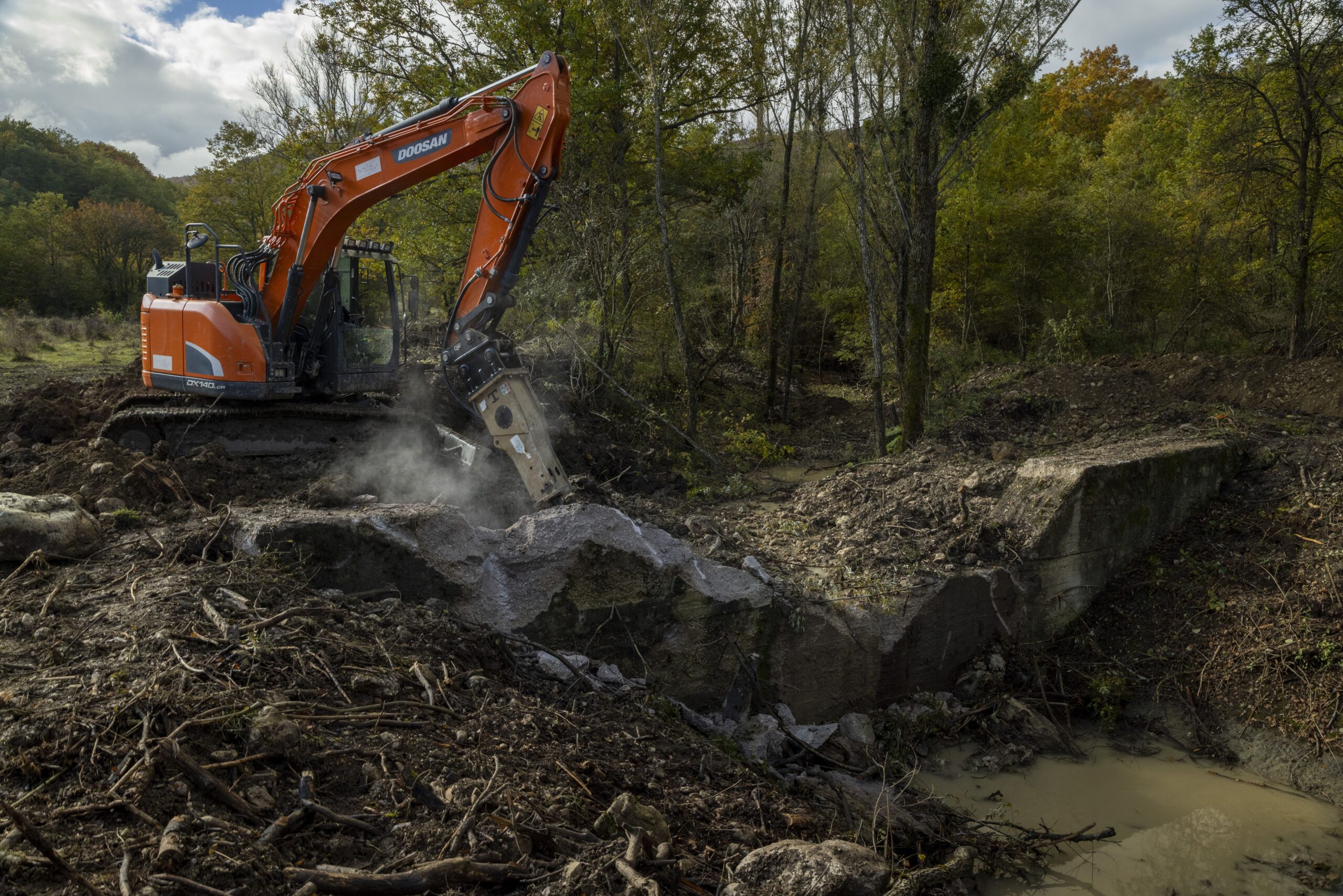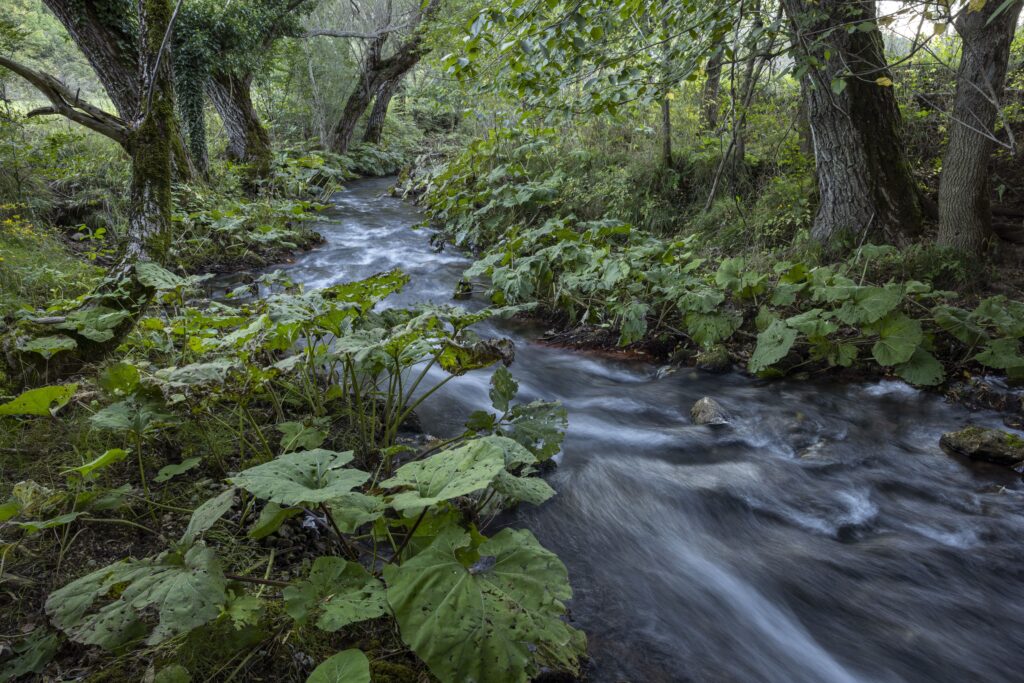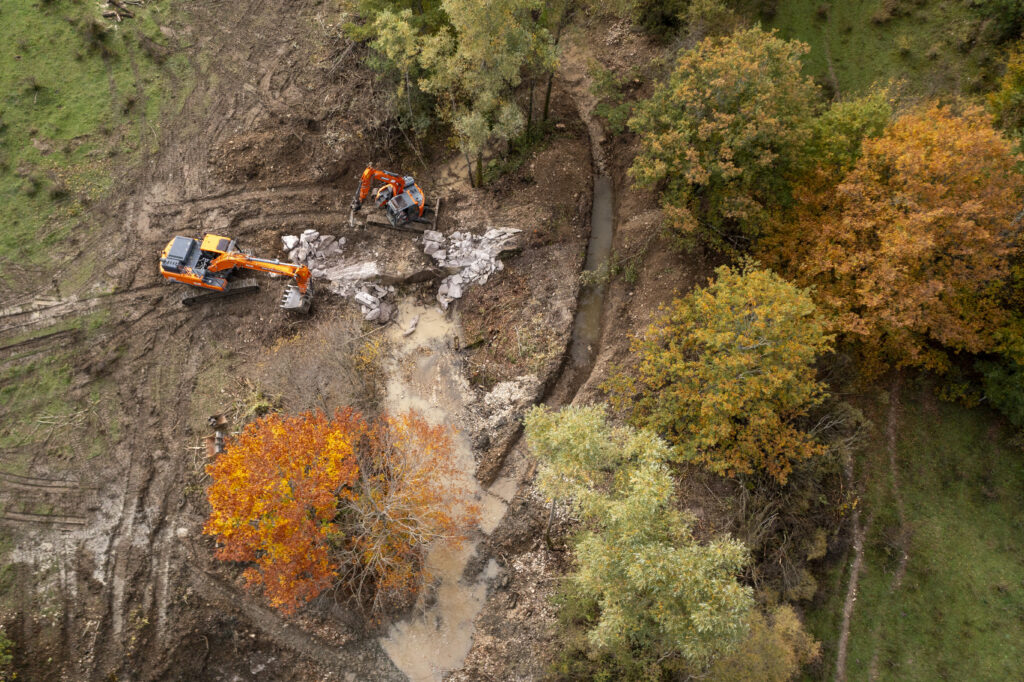Supported by funding from the Open Rivers Programme, the Rewilding Apennines team have overseen the removal of five barriers on the Giovenco River. This is a critical step forward in restoring the natural dynamics of the river system, breathing new life into the landscape and delivering benefits to local communities.

Breaking barriers
Funded by a 157,000-euro grant from the Open Rivers Programme, the Rewilding Apennines team have just completed the removal of five weirs on the Giovenco River. Weirs are barrier across rivers that alter the flow of water, change water levels, and negatively impact river ecosystems. With the removal of the barriers, an 11-kilometre stretch of the Giovenco – which flows from south to north in the Abruzzo, Lazio and Molise National Park, in the heart of the Central Apennines rewilding landscape in Italy – is flowing freely again for the first time in many decades.
The ambitious “GIOV & GO – A free-flowing Giovenco” initiative is the first of its kind in the entire Apennine region. The pioneering intervention, involving a number of excavators, saw the removal of the barriers, which were separated by 80-metre intervals, together with adjacent concrete riverbank walls. By enabling the free flow of water and increasing connectivity, these restoration efforts will significantly improve habitat quality, boost aquatic and riparian biodiversity, and enhance the overall health of the river and surrounding landscape.
“Removing these weirs will free the river to repair itself,” says Fabien Quétier, Rewilding Europe’s Head of Landscapes. “This initiative exemplifies rewilding’s approach to nature recovery, with relatively small and targeted interventions such as dam removal unlocking nature’s huge potential to restore itself.”

Wide-ranging benefits
Artificial barriers such as dams and weirs are considered one of the main threats to aquatic and riparian biodiversity on a global scale. They significantly degrade river ecosystems by causing habitat loss and fragmentation, altering the distribution of sediments and nutrients, and concentrating pollutants.
The removal of the weirs on the Giovenco River will deliver significant ecological and socio-economic benefits. The free flow of water will enable the migration of protected and vulnerable aquatic species, such as the white-clawed crayfish and Mediterranean trout. Riparian vegetation will also have the opportunity to reclaim habitat, delivering wider benefits to many other animal species, particularly the European otter, which is naturally recolonising the area. Other mammals, as well as birds and insects, will also benefit from the restoration of natural habitats and a healthier, more connected ecosystem.
The removal of the concrete walls and weirs will also allow the Giovenco to resume its natural processes of erosion and sedimentation, creating meanders and diverse habitats, and help to reverse a trend in localised erosion.

Community engagement and development
Through their restoration efforts on the Giovenco, the Rewilding Apennines team are also aiming to strengthen the connection between the river and local communities, highlighting the beauty and significance of the area. Educational and awareness-raising activities will increase understanding of the importance of interventions aimed at restoring rivers, and highlight how communities can benefit from them economically – for example, through the development of nature-based tourism in the Giovenco Valley.
“We have already held a couple of meetings in local communities to discuss and promote river restoration,” says Angela Tavone, Rewilding Apennines Communications Manager. “We are also going to organise a hike and talk to some students in the coming months, and engage with other stakeholders connected with the landscape.”
Scaling up
The removal of barriers on the Giovenco could act as a catalyst for further barrier removals in the Central Apennines landscape. These could take place on both on the same river – restoring natural flow conditions along a 25-kilometre stretch – and in other poorly connected waterways, such as the Liri River. The team are applying for another grant from the Open Rivers Programme for the removal of a dam on the Liri.
“Rewilding Apennines is proud to be engaged in this restoration work on the Giovenco,” says Mario Cipollone, Rewilding Apennines Team Leader. “These efforts represent a first step towards restoring threatened freshwater ecosystems across the Central Apennine region.”
The bigger picture
Rivers deliver a wide range of essential benefits to people and nature. With climate change bringing new challenges, we urgently need a new relationship with water – accepting it into our landscapes again, and rewilding it where we can. This means giving rivers the space and freedom to manage themselves, with dynamic, natural processes such as the free flow of water and flooding returning them to health. This is what Rewilding Europe is doing in many of its own landscapes, through measures such as dam removal.
Complementing the funding provided by the Open Rivers Programme, financial support for the weir removal on the Giovenco has been provided by Rewilding Europe, which has been part of the European movement for free-flowing rivers for many years as a founding partner of Dam Removal Europe.
Essential collaboration
Key local institutions, such as the Abruzzo, Lazio and Molise National Park, and the Municipality of Bisegna, supported of the weir removal on the Giovenco. The park authority, in particular, helped by carrying out promotional and awareness-raising activities in the Giovenco Valley.
To oversee the technical and design side of the initiative, Rewilding Apennines engaged a team of technical and scientific consultants, including environmental engineer Giandomenico Mercuri and naturalist Ileana Schipani, who were involved in every aspect of the work. These consultants ensured that short-term environmental impacts at the weir removal site were minimised, while restoration work will also be carried out to speed up the recovery of nature around the barriers that have been removed.

Invaluable support
Rewilding Europe’s work in our rewilding landscapes is supported by a wide range of highly valued partners. We would particularly like to acknowledge those providing core funding – notably the Ecological Restoration Fund, the Dutch Postcode Lottery, WWF-Netherlands, and Arcadia. Their longstanding support plays a critical role in enabling us to deliver and scale up rewilding impact.
